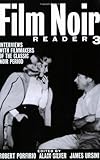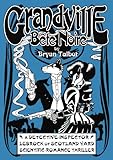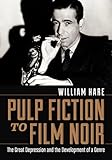Film Noir Reader: Interviews with Filmmakers of the Classic Noir Period Bk.3 (Film Noir Reader)
Grandville Bete Noir
Encyclopedia of Film Noir
Pulp Fiction to Film Noir: The Great Depression and the Development of a Genre
The Stranger (Orson Welles) [DVD] [1946]
![The Stranger (Orson Welles) [DVD] [1946]](http://ecx.images-amazon.com/images/I/51NDB21ETQL._SL160_.jpg)
In a way, Scarlet Street is a remake. It’s taken from a French novel, La Chienne (literally, “The Bitch”) that was first filmed by Jean Renoir in 1931. Renoir brought to the sordid tale all the colour and vitality of Montmartre; Fritz Lang’s version shows us a far harsher and bleaker world. The film replays the triangle set-up from Lang’s previous picture, The Woman in the Window, with the same three actors. Once again, Edward G Robinson plays a respectable middle-aged citizen snared by the charms of Joan Bennett’s streetwalker, with Dan Duryea as her low-life pimp. The plot closes around the three of them like a steel trap. This is Lang at his most dispassionate. Scarlet Street is a tour de force of noir filmmaking, brilliant but ice-cold.
The Stranger, according to Orson Welles, “is the worst of my films. There is nothing of me in that picture”. But even on autopilot Welles still leaves most filmmakers standing. A war crimes investigator, played by Edward G Robinson, tracks down a senior Nazi to a sleepy New England town where he’s living in concealment as a respected college professor. Welles wanted Agnes Moorehead as the investigator and Robinson as the Nazi Franz Kindler, but his producer, Sam Spiegel, wouldn’t wear it. So Welles himself plays the supposedly cautious and self-effacing fugitive–and if there was one thing Welles could never play, it was unobtrusive. Still, the film’s far from a write-off. Welles’ eye for stunning visuals rarely deserted him and, aided by Russell Metty’s skewed, shadowy photography, The Stranger builds to a doomy grand guignol climax in a clocktower that Hitchcock must surely have recalled when he made Vertigo. And Robinson, dogged in pursuit, is as quietly excellent as ever.
On the DVD: sparse pickings. Both films have a full-length commentary by Russell Cawthorne which adds the occasional insight, but is repetitive and not always reliable. The box claims both print have been “fully restored and digitally remastered”, but you’d never guess. –Philip Kemp
<- Read More Buy Now for [wpramaprice asin=”B000096KFV”] (Best Price)





![The Ultimate Film Noir Collection [DVD]](http://ecx.images-amazon.com/images/I/51ER8RM9CdL._SL160_.jpg)
